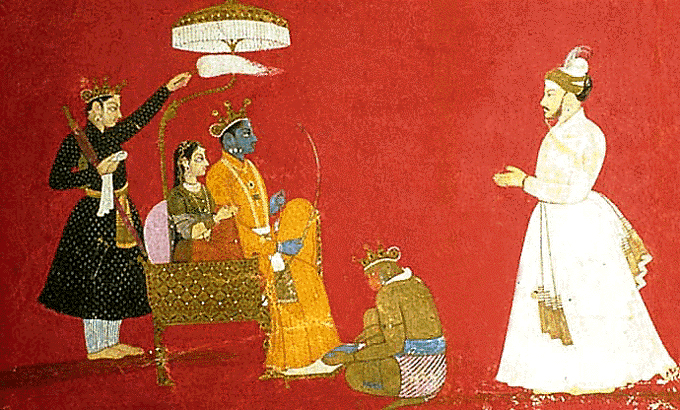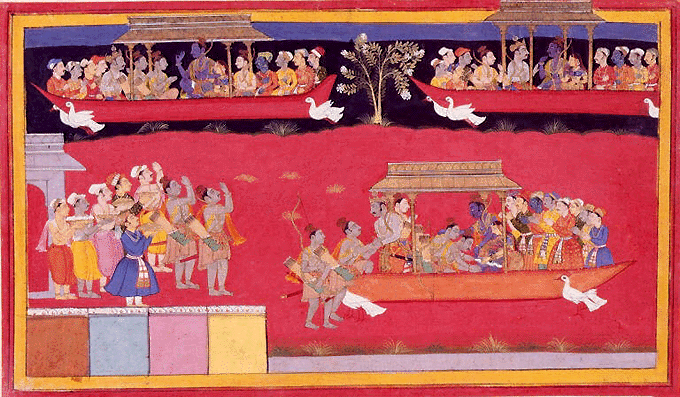Srimad Ramayana, Part 3
BY: HAREKRSNA.COM

King Dasaratha visits Rama
Apr 10, CANADA (SUN) — The Travels of Rama by Valmeeki Muni - A 4-part series, translated by Karnamrita dasa.
Volume 1, The Ayodhya Kanda
(The Book of Ayodhya)
By the Mercy of His Divine Grace Om Vishnupada Sri Srimad A. C. Bhaktivedanta Swami Prabhupada - Translated by Karnamrita Dasa, 1997
CANTO 5
Vasishta Enjoins Lord Rama to Fast
1) Having instructed Rama, who was to be anointed the next day, King Dasaratha
summoned his family priest, Vasishta, and spoke to him as follows:
2) “Please go to
Rama’s residence, O ascetic, and persuade Him and His wife to observe a fast so His
succession to the throne may be auspicious.”
3) The blessed Vasishta, the supreme scholar of the Veda, having said, “So be it!”, proceeded personally to Lord Rama’s palace.
4) In order to persuade the heroic Raghava– an
adept in the use of mantras, to observe a fast, Vasishta, a knower of mantras, mounted a
chariot suitable for a brahmana.
5) Upon reaching Rama’s palace, which shone with the splendour of a mass of white
clouds, the sage entered by chariot and proceeded through its three courtyards.
6) As he arrived, Lord Rama, who considered the sage to be worthy of honour, came
quickly out of His residence.
7) Hastily approaching the chariot, the intelligent Lord
helped Vasishta to alight from the vehicle.
8-9) Vasishta greeted Rama, and noted His humility with satisfaction. The sage then
addressed Rama, who deserved affection, and increased His joy, saying, “Your father is
delighted with You, and thus he will bestow the kingdom upon You. You should observe
a fast today together with Sita.
10) In the morning King Dasaratha will anoint You crown-prince with great happiness, just as Nahusha anointed Yayati.”
11) So saying, the pure ascetic counselled Lord Rama to fast together with the princess of
Videha [Sita].
12) Thereafter, having been suitably worshipped by Rama, the king’s
preceptor took leave of Him and proceeded from His palace.
13) Sitting then with His companions, who ever spoke endearingly, the Lord shortly took
leave of them, and receiving their salutations He entered His private quarters.
14) Rama’s palace thronged with blissful men and women, and it had the semblance of a
lake decorated with flocks of intoxicated birds and full blown lotuses.
15) Upon leaving Ramachandra’s residence, which resembled a king’s palace, Vasishta beheld the street crowded with people.
16) The royal thoroughfares of Ayodhya thronged
with a great multitude of groups of curious men pressed close together, and was thus
made impassable.
17) There was a joyous commotion as the waves of citizens glided
together, and the king’s road resounded as if with the roar of an ocean.
18) The carriageway was sprinkled with water and strewn with flowers, and the whole of Ayodhya
was hung with garlands and with flags that day.
19) Indeed, the crowds of Ayodhyites,
along with their womenfolk and children, were so enthusiastic to see the anointment of
Lord Rama that they yearned for the rising of the next day’s sun.
20) The people were
eager to behold the great festival in Ayodhya, which would beautify their existence and
expand their transcendental ecstasy.
21) The king’s highway being obstructed by crowds, the sovereign’s preceptor parted the
flood of people as it were, gradually making his way to the royal palace.
22) Ascending
the steps to the king’s residence, which resembled a mountain summit surrounded by
white clouds, Vasishta met Maharaja Dasaratha, just as Brihaspati meets Indra.
23)
Leaving the imperial throne as soon as he descried him, the king asked him to reveal his
thoughts, and Vasishta informed him that he had done as bidden.
24) In a like manner, the members of the royal council, who sat with the emperor, rose
from their seats to show respect to his family priest.
25) With the consent of his spiritual
master, Dasaratha then dismissed the assembly of men, and entered his private apartments
like a lion entering a mountain cave.
26) Upon entering that excellent dwelling, which was crowded with youthful women, and
which vied with Indra’s abode, King Dasaratha shone like the moon in a star spangled sky.
THUS ENDS THE FIFTH CANTO OF THE AYODHYA KANDA
OF VALMEEKI MUNI'S RAMAYANA

Rama Welcomed Back to Ayodhya
CANTO 6
Lord Rama Follows Certain Vows
1) Upon Vasishta departing, Lord Rama bathed with a restrained mind and worshipped
Lord Narayana in the company of His large-eyed wife.
2) Taking a vessel containing clarified butter upon His head— according to the scriptural ordinance— He poured it into
blazing fire for the pleasure of the Supreme Lord, Vishnu.
3-4) He ate the remnants of the
oblation, desiring that which was dear to His heart; thereafter, with His mind concentrated
upon Narayana, and saying little, He lay with Sita upon a bed of kusa-grass in the splendid
temple of Lord Vishnu.
5) When three hours of the night yet remained, Rama awoke and had the entire temple
decorated according to the prescribed rule.
6) Having listened to the delightful words uttered by the professional reciters and singers, He chanted His morning gayatri with a
concentrated mind.
7) He then eulogised Lord Madhusoodana [Vishnu] and bowed His
head before Him, and, clothed in spotless linen, He urged the brahmanas to recite
auspicious prayers.
8) Then was Ayodhya filled with the resonance of their deep, sweet
voices, which harmonised with the sounds of musical instruments.
9-11) Hearing that Lord Raghava and the Princess of Videha had fasted during the night,
and that Rama was to be anointed that day, the Ayodhyites were filled with joy.
Thereafter, seeing that morning had come, the citizens began to decorate the city.
12-13)
Flags and banners were hoisted on the spires of temples that resembled mountain-tops
surrounded by white clouds; they were hung at cross-roads and across carriageways, upon
places of worship, and from watch towers; they adorned the shops and booths of various
well-to-do merchants, the homes of prosperous householders, assembly-halls, and any
visible tree.
14) The citizens then hearkened to the songs and recitations of professional
singers and actors, which were a joy to the mind and to the ear.
15) People met at cross-roads and in each others’ homes and discussed Lord Rama’s forthcoming installation.
16)
Even groups of small boys playing at the doorstep gathered together and discussed Lord
Rama’s anointment.
17) The citizens strewed the king’s road with flowers and perfumed it with the scent of
incense at the time of Lord Rama’s inauguration, thus rendering it beautiful.
18) Anticipating the approach of darkness [later that day] they then erected lamp-posts along every
carriageway to provide illumination.
19) Longing for the anointment of Rama as heir-
apparent, the residents of Ayodhya decked the city out in finery.
20-21) Gathering at every crossroad and in assembly halls, they eulogised the emperor,
saying, “What a great soul is King Dasaratha, the delight of the House of Ikshvaku!
Knowing himself to be advanced in years he will shortly anoint Rama heir-apparent.
22)
We are indeed fortunate that as king of the earth, Lord Rama, who has seen what is noble
and what is vile in this world, will long protect us.
23) He is modest, learned, and righteous. He is dear to His brothers and They to Him. Verily, Raghava is as affectionate to
His subject as He is to His siblings.
24) Long live the sinless Dasaratha! By his grace we
shall witness the anointment of Rama!”
25) The citizens' various utterances were heard by outsiders who, hearing the tidings of
Rama’s inauguration, came from their habitations to Ayodhya.
26) Indeed, the king’s
subjects came to the capital from all points of the compass to witness the anointment of
Lord Rama, and they filled the Lord’s city to the brim.
27) And the great multitudes of
people spreading through the capital were heard like the roaring of the ocean when the
force of its waves is augmented by the rising of the full moon.
28) At that time Ayodhya resembled Indra’s residence, as it thronged with those wishing
to behold Rama’s inauguration. It resounded with a deafening hubbub and it had the
appearance of a sea full of ocean-going aquatics.
THUS ENDS THE SIXTH CANTO OF THE AYODHYA KANDA
OF VALMEEKI MUNI'S RAMAYANA
